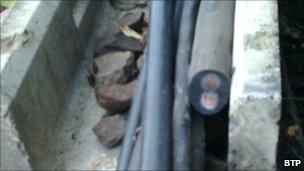Police target £770m worth of metal cable thefts
- Published
A police task force has been launched to tackle the growing problem of cable theft from railway and electricity networks.
The crime is being linked to a rise in the price of copper as metal thefts are costing the UK around £770m a year.
Network Rail is now coding its cable to make it harder to steal.
The British Transport Police says that only terrorism currently has a higher priority.
It wants to see cashless transactions at scrap metal dealers.
The British Metal Recycling Association - which represents a £3bn-a-year industry - says it is working with utility companies, Network Rail and police chiefs to tackle the problem.
Copper prices rising
Each time the price of copper increases, so too does cable theft - the metal sold for £6,200 ($10,000) a tonne in January, a month that saw a doubling in rail cable theft compared to January last year.
Network Rail estimates it has cost it £35m in the past four years, and general manager Warrick Dent said: "Metal thieves targeting the railway are causing misery to thousands of passengers and freight users. They are costing the industry and the wider economy millions of pounds and that figure is rising."
One case from earlier this month illustrates his point - from Newark, Nottinghamshire, on the East Coast Main Line between London and Edinburgh.
Nottingham Crown Court was told that on 8 October last year, two Newark men, Damien Kelham, 25, and 28-year-old Billy Mitchell, stole a few metres of signalling cable.
They received £44 in cash for the stolen copper but their actions created mayhem on the train line. More than 100 trains were affected and thousands of passengers delayed. It cost Network Rail £75,000. The men were each sentenced to three years in prison.
Huge disruption
Acting Detective Inspector Granville Sellers, head of the British Transport Police's North and East cable squad, said: "It's often people like drug addicts looking to fund their habit, but there are also organised gangs.

Cables are stripped to reach the copper inside
"These people are risking their lives, often for just a few pounds worth of copper. They have no idea of the disruption to the public and the cost to industry".
British Transport Police raided a house in Rotherham, South Yorkshire, last week to arrest an 18-year-old who was one of three young people suspected of rail cable theft. A 13-year-old boy carrying a pair of bolt cutters had already been apprehended along with an 18-year-old at two o'clock in the morning.
Police found a hole in a fence led to rail tracks and close by was cabling. Officers searching the Rotherham house found 30 metres of cable in a garden shed and two holdalls containing other potential evidence.
At the side of the house lay a mound of different coloured cable, stripped of its copper and there for anyone walking by to see.
It is not just rail networks which are affected. Gas supplies, electricity companies and telecoms cables are also targeted. Even small copper parts stolen from outside homes can leave customers without phones.
Tony Glover from the Energy Networks Association said: "We're seeing a clear increase. There were 4,000 incidents in energy and telecoms in the past year.
"We're also seeing increasing theft of gas-related infrastructure with obvious serious safety issues. With a predicted world deficit we expect thefts to increase considerably this year".
He added that "at a gas governor site in Wales which regulates gas pressure, a theft of a few pounds of copper could have led to an explosion".
A spokeswoman for E.on said: "In 2010 across the central networks region we experienced around 850 incidents of copper theft from our network resulting in repair costs of over £1,000,000. So far this year we've seen around 50 incidents a month to date, which is around double of that seen during January and February of last year."
The British Metal Recycling Association has launched a voluntary code of practice as part of its efforts to reduce the number of thefts but as the price of copper continues to rise, illegal ways of obtaining the metal will continue.
Thieves are still prepared to put themselves at serious risk of injury, or even death through electrocution, to hack through cables for a few pounds of wiring.
To find out more about copper theft in the UK, visit Sarah Sturdey's 5 live blog. For more 5 live interviews, please go to the Best Bits page.
- Published14 February 2011
- Published10 February 2011
- Published29 January 2011
- Published26 January 2011
- Published17 January 2011
- Published26 October 2010